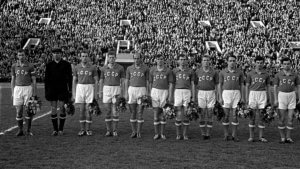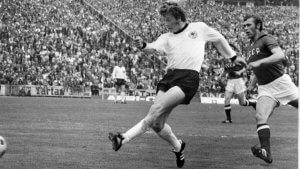The History of the European Championship

It’s the most important team tournament in Europe, organized by UEFA every four years since 1960. In this article, we’ll tell you about the history of the European Championship, its winners, and other interesting information about the competition.
The first editions of the European Championship
Although the first European Championship was held in 1960, since 1927, there was talk about organizing a European tournament. In fact, they had this already in South America with the Copa América (founded in 1916).
Why did we have to wait so long for it to take place? Basically, some European federations didn’t agree because it was quite complicated to organize the meetings in a postwar period.
The 1957 UEFA Congress- an entity that had been founded three years earlier- unveiled the idea of a continental competition.
This was how the first European Championship was organized in 1960, a complicated mission to get all the teams to participate. In fact, England, East Germany, and Italy didn’t participate.
This was the way they structured it: elimination matches until there were four, which would play in the final phase. Then, the final was held in France and featured the Soviets and Yugoslavs. The first team won 2-1 in overtime, after tying 1-1 in the regulation 90 minutes.

Four years later, they organized a new EuroCup, with the headquarters in Spain. The Spaniards were the winners against the defenders of the title, in a match at the Santiago Bernabéu in Madrid. Third place went to Hungary and fourth place to Denmark.
Name change and the third edition
In 1968, they organized the third edition, and Italy hosted it. In that year, they changed the name to European Nations Championship and adopted a new format: qualification groups.
The winner was Italy, the second was Yugoslavia, the third was England and the fourth was the Soviet Union. The winners of the following editions were East Germany (1972) and Czechoslovakia (1976).

Since the 1980 edition, the European Championship has had eight participating teams. In that year, the winning team was East Germany. Then, in 1984, France won, and in 1988 the Netherlands.
The 1992 edition turned out to be a great change for the competition, since it was renamed the European Championship. The winner this year was Denmark.
In 1996, the tournament increased its number of participants to 16, and the winner was Germany. In the 2000 edition, both Germany and the Netherlands hosted, with France being the winner.
Greece won the next European Championship in 2008, and Austria and Switzerland organized it. Spain won, and they won again in 2012 (organized by Poland and Ukraine). Finally, the last edition, in 2016, was won by Portugal, which was the first time in history that Portugal won the European Championship.
European Championship statistics and records
So far, Germany and Spain are the top winners of the European Championship, with three titles each. The Germans won in 1972, 1980 and 1996; the Spanish won this championship in 1964, 2008 and 2012. Finally, France has won two cups: 1984 and 2000.
Regarding representation, Germany has been present in twelve editions, Russia in eleven and Spain in ten. With nine participants from France, Italy, the Netherlands, the Czech Republic, and England.
The historical scorer’s category is led by Cristiano Ronaldo with 29 goals since his debut in 2004. Then, in second place we have the Swedish, Zlatan Ibrahimovic with 25 goals. In fact, he also played for the first time in 2004. In third place is the Irishman, Robbie Keane, who in just two editions (2012 and 2014) scored 23 goals.

Finally, the players with the most matches in the EuroCup are the Italian Gianluigi Buffón (58 games), Checho Petr Cech (50), the Swedes, Kim Kallstrom, and Andreas Isaksson and the Irishman, Robbie Keane (49 each).
An unprecedented delay
The next edition of the EuroCup was scheduled for between June and July 2020 in twelve different cities on the continent. This particular decision was to celebrate the 60th anniversary of the competition.
However, due to the coronavirus pandemic, they pushed it back to between June 11 and July 11, 2021. Thus, the European Championship will go through its first suspension in its history. Soccer fans will have to wait to see their idols in action!
It’s the most important team tournament in Europe, organized by UEFA every four years since 1960. In this article, we’ll tell you about the history of the European Championship, its winners, and other interesting information about the competition.
The first editions of the European Championship
Although the first European Championship was held in 1960, since 1927, there was talk about organizing a European tournament. In fact, they had this already in South America with the Copa América (founded in 1916).
Why did we have to wait so long for it to take place? Basically, some European federations didn’t agree because it was quite complicated to organize the meetings in a postwar period.
The 1957 UEFA Congress- an entity that had been founded three years earlier- unveiled the idea of a continental competition.
This was how the first European Championship was organized in 1960, a complicated mission to get all the teams to participate. In fact, England, East Germany, and Italy didn’t participate.
This was the way they structured it: elimination matches until there were four, which would play in the final phase. Then, the final was held in France and featured the Soviets and Yugoslavs. The first team won 2-1 in overtime, after tying 1-1 in the regulation 90 minutes.

Four years later, they organized a new EuroCup, with the headquarters in Spain. The Spaniards were the winners against the defenders of the title, in a match at the Santiago Bernabéu in Madrid. Third place went to Hungary and fourth place to Denmark.
Name change and the third edition
In 1968, they organized the third edition, and Italy hosted it. In that year, they changed the name to European Nations Championship and adopted a new format: qualification groups.
The winner was Italy, the second was Yugoslavia, the third was England and the fourth was the Soviet Union. The winners of the following editions were East Germany (1972) and Czechoslovakia (1976).

Since the 1980 edition, the European Championship has had eight participating teams. In that year, the winning team was East Germany. Then, in 1984, France won, and in 1988 the Netherlands.
The 1992 edition turned out to be a great change for the competition, since it was renamed the European Championship. The winner this year was Denmark.
In 1996, the tournament increased its number of participants to 16, and the winner was Germany. In the 2000 edition, both Germany and the Netherlands hosted, with France being the winner.
Greece won the next European Championship in 2008, and Austria and Switzerland organized it. Spain won, and they won again in 2012 (organized by Poland and Ukraine). Finally, the last edition, in 2016, was won by Portugal, which was the first time in history that Portugal won the European Championship.
European Championship statistics and records
So far, Germany and Spain are the top winners of the European Championship, with three titles each. The Germans won in 1972, 1980 and 1996; the Spanish won this championship in 1964, 2008 and 2012. Finally, France has won two cups: 1984 and 2000.
Regarding representation, Germany has been present in twelve editions, Russia in eleven and Spain in ten. With nine participants from France, Italy, the Netherlands, the Czech Republic, and England.
The historical scorer’s category is led by Cristiano Ronaldo with 29 goals since his debut in 2004. Then, in second place we have the Swedish, Zlatan Ibrahimovic with 25 goals. In fact, he also played for the first time in 2004. In third place is the Irishman, Robbie Keane, who in just two editions (2012 and 2014) scored 23 goals.

Finally, the players with the most matches in the EuroCup are the Italian Gianluigi Buffón (58 games), Checho Petr Cech (50), the Swedes, Kim Kallstrom, and Andreas Isaksson and the Irishman, Robbie Keane (49 each).
An unprecedented delay
The next edition of the EuroCup was scheduled for between June and July 2020 in twelve different cities on the continent. This particular decision was to celebrate the 60th anniversary of the competition.
However, due to the coronavirus pandemic, they pushed it back to between June 11 and July 11, 2021. Thus, the European Championship will go through its first suspension in its history. Soccer fans will have to wait to see their idols in action!
All cited sources were thoroughly reviewed by our team to ensure their quality, reliability, currency, and validity. The bibliography of this article was considered reliable and of academic or scientific accuracy.
- MILENIO – Eurocopa, aplazada por primera vez en su historia – Marzo 2020 – https://www.milenio.com/deportes/futbol-internacional/eurocopa-suspendida-por-primera-vez-en-su-historia
- El tiempo – Los cinco grandes golpes que ha sufrido la Eurocopa en su historia – Marzo 2020 – https://www.eltiempo.com/deportes/futbol-internacional/cinco-problemas-que-ha-tenido-la-eurocopa-en-su-historia-473826
This text is provided for informational purposes only and does not replace consultation with a professional. If in doubt, consult your specialist.








